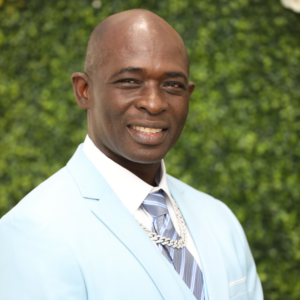Lescene Edwards
In 2013, Lescene Edwards was wrongly convicted of the murder. The prosecution at the time argued that Lescene had murdered his partner and staged it as a suicide. The Death Penalty Project, alongside leading barristers and forensic experts overturned his conviction in 2022. The Privy Council declared his conviction unsafe.
Lescene's Story
Lescene’s partner, Ms Harris-Vasquez, tragically died from a single gunshot wound to the head in their home in Jamaica, 2003. Despite a suicide note being found near her body, the prosecution’s case was that Lescene fired the fatal shot , failing to investigate the alternative theory that the shot was self-inflicted. Lescene was charged with murder and suffered a 10-year trial delay before his case was heard in the Jamacia Court of Appeal.
When his case did reach trial, there were serious failings around the gathering and storing of essential evidence, including Ms Vasquez’s clothes which were not immediately tested for gunshot residue, and a lack of adequate forensic expert testimony. The prosecution argued that Lescene had murdered his partner and staged the scene to appear as if she had committed suicide. In October 2013, Lescene was convicted and sentenced to life imprisonment, with the possibility of parole only after serving a minimum of 35 years.
In 2018 during an appeal at the Court of Appeal, the court accepted that there had been failures in the investigation of the case and reduced his parole conditions from a minimum of 35 years to 20 years before he was eligible for parole. However, his murder conviction was upheld.
Fresh forensic evidence
In 2018, The Death Penalty Project agreed to assist Lescene with his case, alongside barristers from Doughty Street Chambers and forensic experts in an appeal to the Privy Council. Presenting fresh forensic evidence to the Privy Council, including gunshot residue as well as blood spatter analysis, the Privy Council declared Lescene’s conviction unsafe and his quashed his conviction in April 2022.
Conviction overturned
Describing the argument that Lescene had anything to do with his partner’s death as a “near impossibility”, the Privy Council also seriously questioned whether Lescene’s case would have even been brought to trial if the expert evidence we presented was available at the time he was charged with murder. The 10-year trial delay was also a major factor in the Privy Council’s judgment, as this delay was found to be an infringement on his constitutional rights.
Lescene finally cleared his name and he and his family received justice at last.
“Due to corruption and bias in the Jamaican justice system I was convicted for murder without evidence and was sentenced to life imprisonment. If it wasn't for The Death Penalty Project I maybe would have died in prison. The pro bono services that The Death Penalty Project offers to poor and vulnerable people around the world is a mere drop in the ocean, but if that drop was not there, justice around the globe would be missing something.”

Case Timeline
-
Lescene’s partner and the mother of his children, Ms Harris-Vaquez died from a gunshot wound to her head. A suicide note was found next to her body.
-
After a 10-year delay, Lescene’s trial finally takes place at the Court of Appeal.
-
Lescene was convicted of murder
-
Lescene was sentenced to life imprisonment with a minimum term of 35 years before being eligible for parole
-
Lescene and his legal team appealed his conviction at the Court of Appeal
-
His hearing took place
-
The Court of Appeal dismisses Lescene’s appeal against his conviction, however accepted there were failures and reduced his parole conditions to a minimum of 20 years before parole
-
The Court of Appeal grants leave to appeal to the Privy Council
-
The Death Penalty Project works with experts to provide fresh forensic evidence
-
The Privy Council grants permission to appeal
-
Lescene’s case is heard in the Privy Council
-
The Privy Council overturns Lescene’s conviction, ruling it as unsafe and that Lescene could not have murdered his wife

















